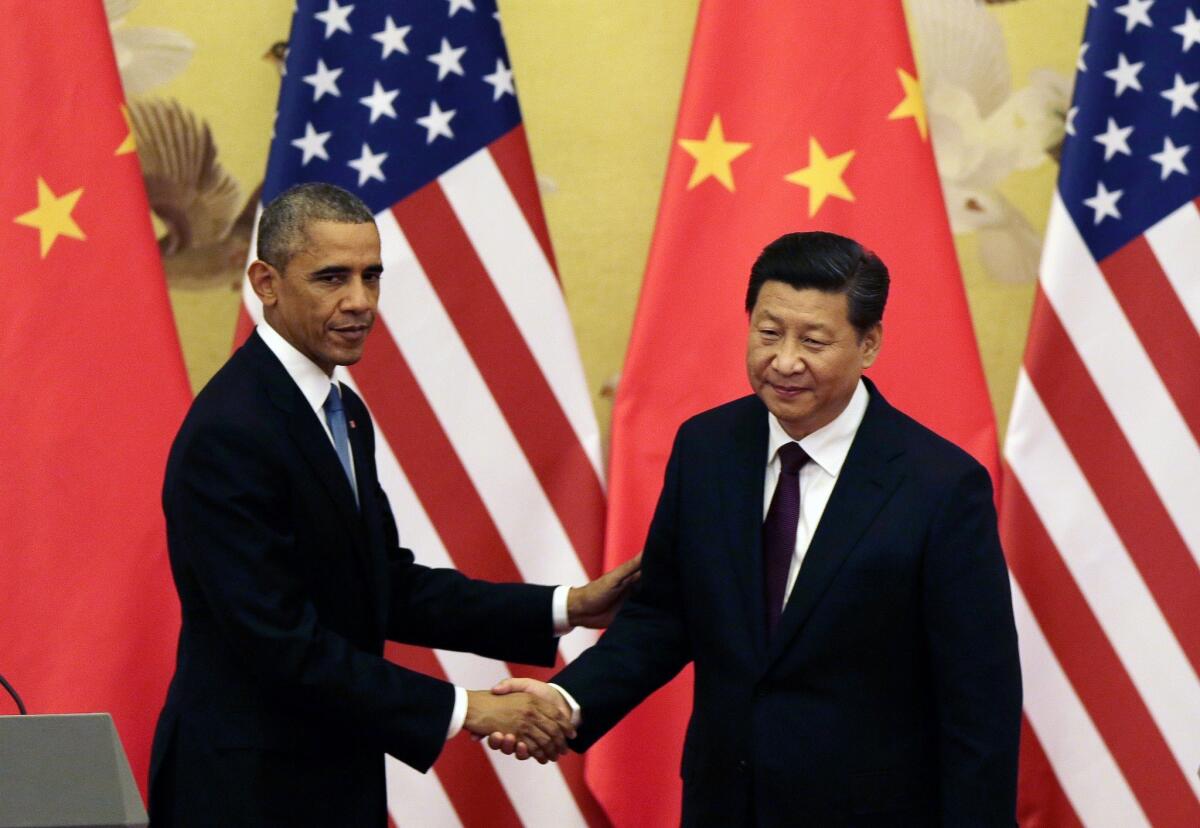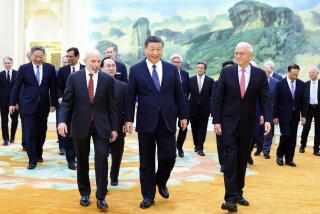Obama will press grievances during Chinese president’s visit, official says

President Obama shakes hands with his Chinese President Xi Jinping after a news conference in Beijing in November 2014. Xi is scheduled to visit the White House this week.
On the eve of a state visit by Chinese President Xi Jinping, the White House national security advisor said Monday that President Obama would be forceful in pressing U.S. grievances, from cybersecurity to human rights, when the two leaders meet.
With Xi due to arrive Monday in Seattle for several days of meetings, Susan Rice said at George Washington University that U.S.-Chinese relations are “overwhelmingly one of progress.”
But she also detailed several U.S. disputes with China, warning that the relationship could be damaged if Beijing doesn’t change its approach.
“As my critics allege, I am rather direct,” Rice said. “I assure you President Obama will be just as direct when he sees President Xi.”
Chinese officials are hoping that Xi’s visit to the White House on Friday -- complete with a 21-gun salute and a formal state dinner -- will provide reassuring images for domestic audiences back in China when sharp economic strains have raised questions about its leadership.
The Obama administration similarly wants to highlight cooperation, not conflict, between the world’s two largest economies.
NEWSLETTER: Get the day’s top headlines from Times Editor Davan Maharaj >>
But the White House faces pressure from some lawmakers, business interests and Republican presidential candidates to show it is standing strong on economic and security issues, including China’s growing military presence near strategic sea lanes in the South China Sea.
Rice said China’s cybertheft of trade secrets and other U.S. corporate data “must stop.” It was not “a mild irritation,” she said, but a concern that “puts enormous strain on our bilateral relationship.”
She said the countries have “profound differences” over human rights, and she cited a draft law in China that limits foreign nongovernmental organizations. The proposed law has set off an outcry by independent groups, including U.S. universities with campuses in China.
The legislation “would be another step in the wrong direction, threatening the very organizations that have promoted China’s development and advanced the friendship between our peoples,” Rice said.
She said many U.S. complaints stem from Chinese actions that “erode the international system, or that slowly eat away at a rules-based order and universal rights, or that give one nation an unfair advantage...”
But Rice also challenged critics, including some Republican presidential candidates, who say Obama should not have honored Xi with a state dinner.
“Determined, constant engagement is necessary to manage our differences,” she said. “If we sought to punish China by canceling meetings or refusing to engage them, we would only be punishing ourselves.”
For foreign policy news, follow me at @richtpau
ALSO:
Burkina Faso coup leader faces military pressure to step down
Russian buildup in Syria no threat to Israel, Putin tells Netanyahu
IAEA reports ‘significant progress’ in its investigation of Iran’s nuclear activities
More to Read
Start your day right
Sign up for Essential California for news, features and recommendations from the L.A. Times and beyond in your inbox six days a week.
You may occasionally receive promotional content from the Los Angeles Times.







